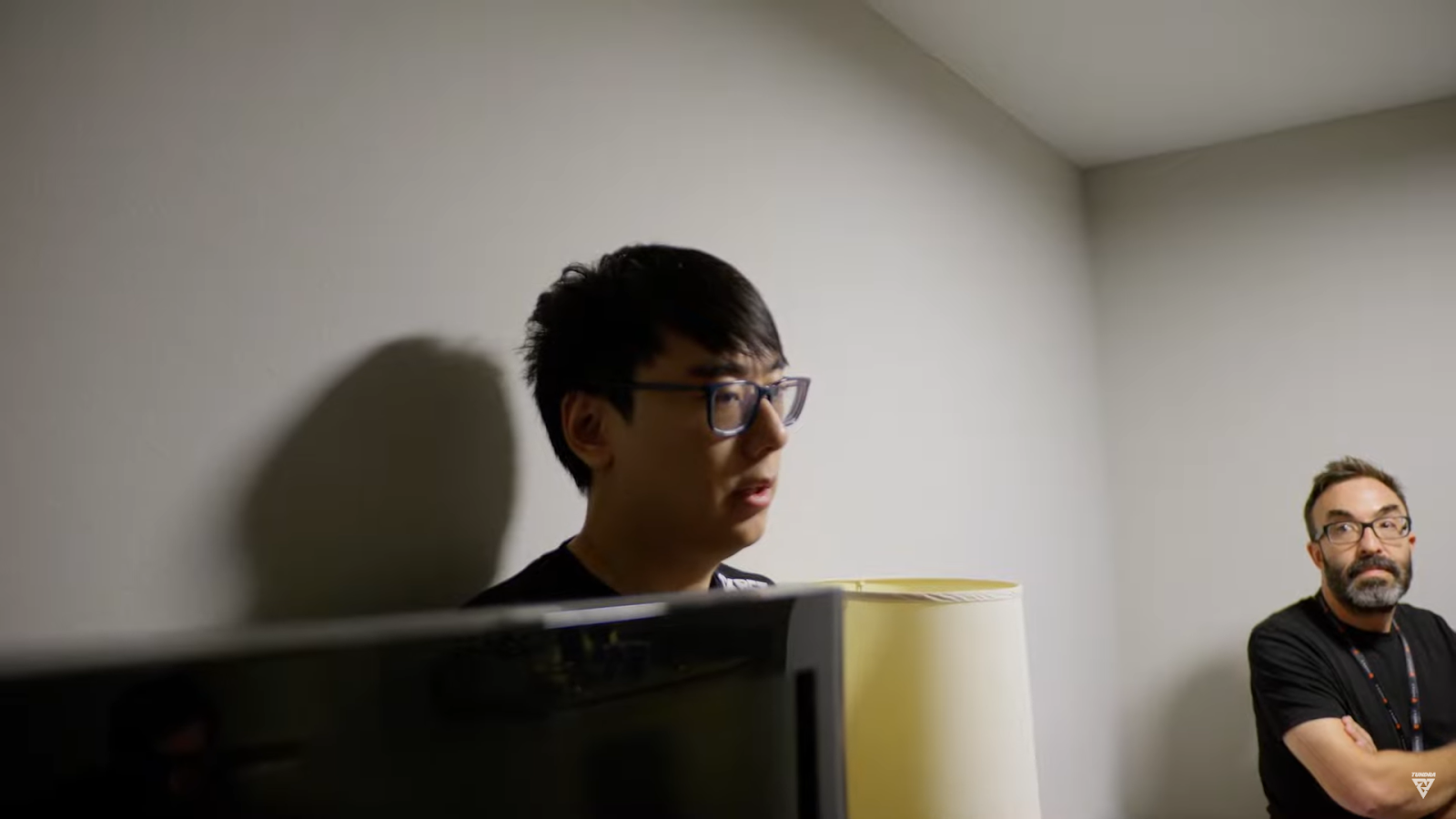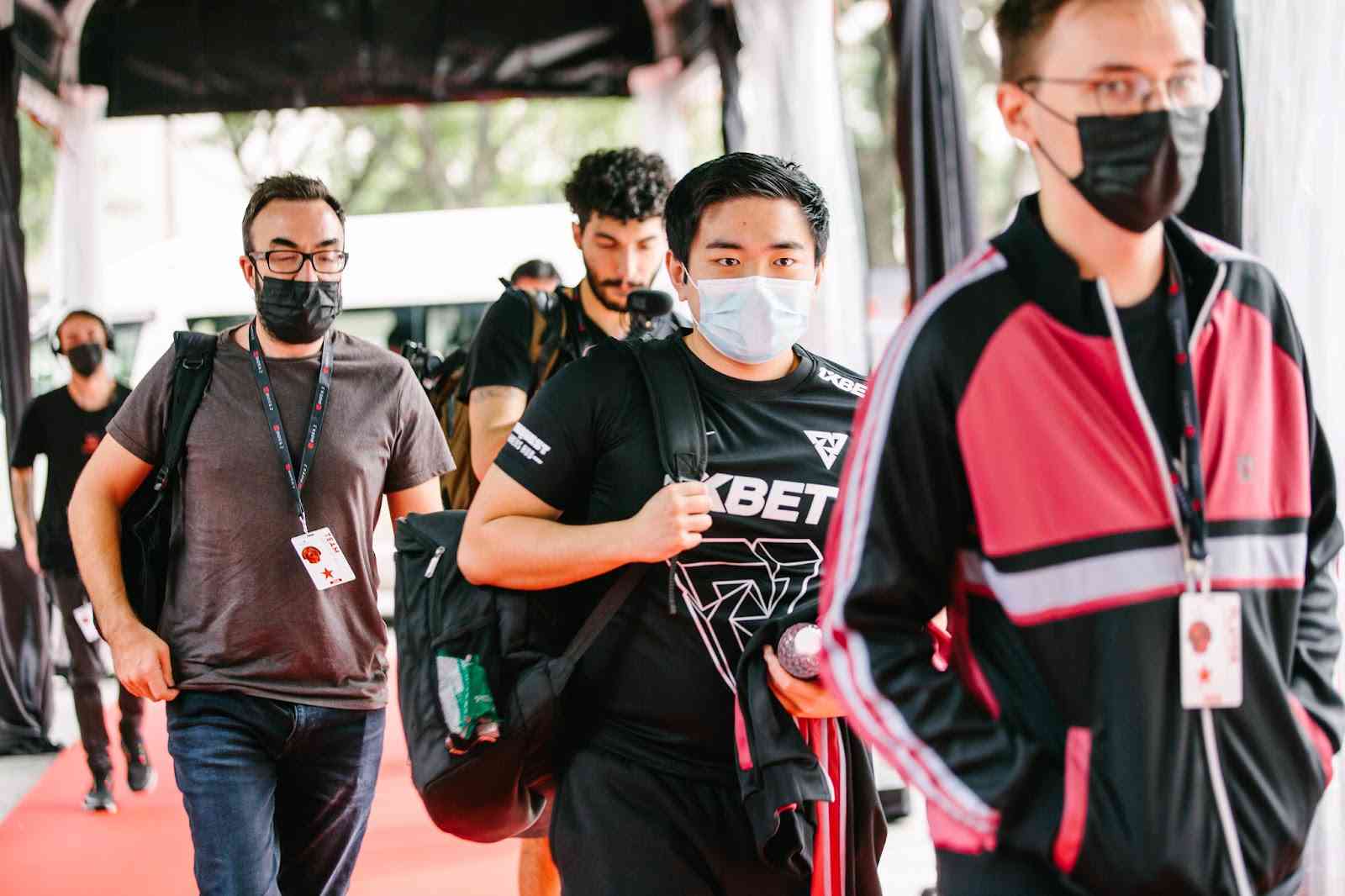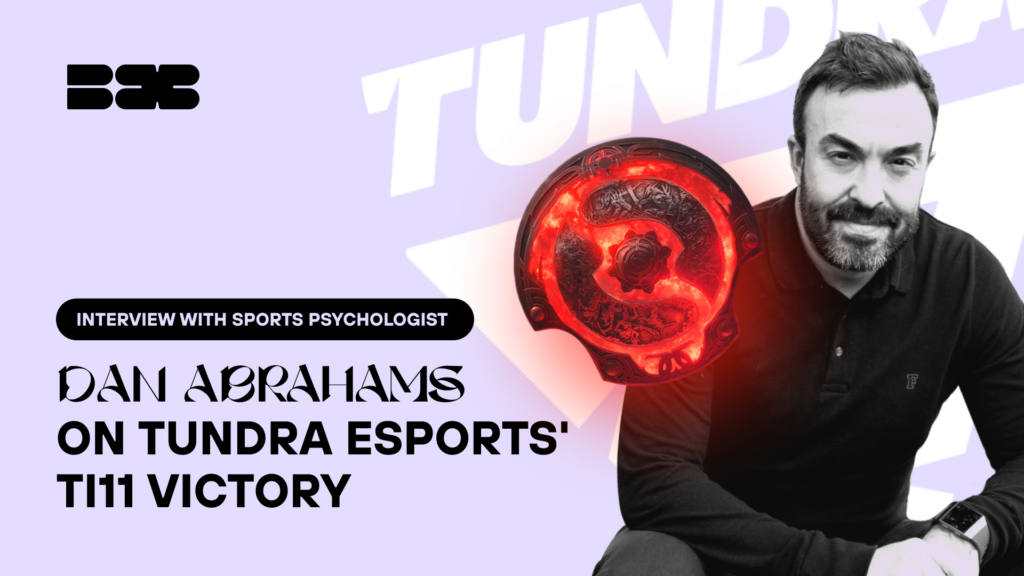Tundra Esports bested their opposition to win The International 11 and lift the Aegis of Champions as its eventual winners. It was the result of a seemingly flawless performance that saw them lose five games in total (four in the group stage and just one in the main event phase) for their entire stay in Singapore and be regarded as one of the most dominant sides in Dota 2 history.
While it is reasonable for one to primarily bask in Tundra’s TI achievement, with its players and coaching staff being the main reason for making it possible, it is equally crucial to include those that supported the team from behind the scenes. After all, they made it possible for the competitors to perform at their maximum capacity.
One such key contributor was sports psychologist Dan Abrahams. As a renowned specialist in the field of sports psychology, Abrahams worked with numerous high-level athletes and teams across numerous traditional sports for more than 20 years before making the jump to esports. He was contacted by Tundra in the summer of 2022 to help their Dota 2 team ahead of TI11 and navigate the second half of the Dota Pro Circuit, where they finished in 15-16th place in the Arlington Major.
Despite the setback, Tundra would rebound emphatically by not dropping a single series, all the while imbuing a calm mindset that contrasted the high stakes that surrounded the tournament. All of this culminated in a grand finals series sweep over Team Secret for Tundra to win the tournament and officially become the best team in the world.
Following Tundra’s TI11 triumph, BLIX.GG spoke to Abrahams to discuss his stint with the organization. In the first of this two-part interview, he goes over how he joined Tundra, his first impression of the team, the struggles they experienced in Arlington, and his thoughts on working in esports.
Joining Tundra
Pedro Romero, BLIX.GG: You’re a well-known sports psychologist and you’ve helped many athletes across various disciplines but joining Tundra Esports for this past DPC season marked your first odyssey into esports. How did this move come about?
Dan Abrahams: One of the owners of Tundra Esports contacted me through various links. I would now say it would be back in the end of May or early June. One of the first things I said to him was how I knew nothing about esports so if he wanted somebody who knew something about it then I was not his man. But thankfully, he said they were not interested in that. They wanted somebody from outside of esports to give them some guidance on the psychology side by utilizing techniques, philosophies, frameworks, and theories so that’s how it came about. I did a couple of Zoom sessions with the team so I introduced myself and laid down a few ideas and that was their opportunity to say, “We don’t like this. We don’t want to speak to Dan again,” but thankfully, they didn’t. They seem to like some of the ideas I brought to the table and then I went to a training camp they were having in Poland. I’ve been working with them quite comprehensively until the end of TI. I went to Texas for one of the Majors and that proved to be quite useful being there with them in how one learns from failure. I’m still a man who knows very little about esports but still watches Dota 2’although a little bit more than I did in June.
This is one of the biggest myths certainly in sports: everybody wants to win and everybody wants to do really well. But getting into the right frame of mind as individuals and as a team, and getting into that sweet spot of intensity that you need for performance, is challenging. You can’t just turn up and be overly intense about winning and performing because it exhausts you… – Dan Abrahams, Sports Psychologist for Tundra Esports
BLIX: What was your first impression of the team in comparison to meeting them online and meeting them in person?
Abrahams: My first impression at the start in Poland was, they were keen to learn. They did not necessarily have the kind of experience they’d want to have had before but they were really keen to learn. They had questions, but at the same time, they were nervous. It doesn’t matter if it’s in or outside of esports but teams aren’t readily amenable to letting the outside world in because they’ve got this team cohesion. They’re not just going to let anybody into their group. It’s not so much that you need to know about esports because that was the first thing I said to them: “Look, I’m not an expert on two things: esports nor you” and I think it relaxed them. I just found five great kids, all of whom had slightly different attitudes toward what I was delivering because perhaps each of them felt they had different skill sets around them. I think all of them recognized pretty quickly even if you believe you’re good at this, we still have to function as a team. It’s not like in any other esport in the way you play as an individual, but if you’re a team, you’re a team.
In those early days, we triggered some good conversations because you’re trying to develop having more sophisticated conversations about performance, psychology, mindset mentality, well-being, and mental health. I continued to support them online and then I visited Texas and that’s when a long season had caught up to them. Those players tried really hard to do really well in Texas. This is one of the biggest myths certainly in sports: everybody wants to win and everybody wants to do really well. But getting into the right frame of mind as individuals and as a team and getting into that sweet spot of intensity that you need for performance, is challenging. You can’t just turn up and be overly intense about winning and performing because it exhausts you. What happened was they tried damn hard but finished stone cold last and we just had a disaster and it was just palpably obvious they were burnt out and exhausted. That’s what tends to happen in burnout: you feel you’re trying; you feel you’re making an effort, and it’s damned confusing as to why it’s not working.
 Abrahams with Tundra Esports during the PGL Arlington Major
Abrahams with Tundra Esports during the PGL Arlington MajorAbrahams with Tundra Esports during the PGL Arlington Major (Credit: Tundra Esports/YouTube)
Abrahams: However, I almost wonder if that was the making of us and I think this is the really interesting dynamic: failure allows you to strip everything back and, without sounding over the top here, lie naked in front of everybody and go, “What are we going to do?” I gave a little bit of a lecture from the pulpit saying, “Guys, you’re burnt out. You’ve had a long season. You’ve done well at the previous Major. You’ve been to Saudi and had intense weeks in Poland.” I know other teams had as well, but this works differently for different teams and in different ways and it was a case of getting away, regroup, find ways to bring back as a team, find ways when you’re in boot camp going into TI, and then find ways to stay at the right level of energy and intensity and retain that sweet spot of in performance mindset throughout TI.
Adjustments from Arlington
BLIX: While Tundra performed well in regional play, they couldn’t translate that success in the Arlington Major where they finished in 15-16th place as a result of, as Aui_2000 (Kurtis Ling) described, over-focusing on some psych concepts’ which led to playing with ‘conscious incompetence’. Do you feel also that was how the team played in that regard?
Abrahams: I say that I would see it through a different lens. We had that conversation, and I would lay myself bare and say maybe Kurtis was right there and maybe I understand those four stages (unconscious incompetence, conscious incompetence, conscious competence, unconscious competence), which simplifies skill development and strips away a lot of complexity. What might be fair to say is you potentially have to go through a period of really thinking about the mental side of the game in order to upskill yourself mentally. That’s always a challenge for any sports psychologist going into any environment no matter the domain. You have to get people being more aware about this stuff. I would actually argue that you always have to consider the mental side of the game and that it never fully goes unconscious. I would openly suggest that it was more to do with burnout than anything else. I would disagree with the notion that “Oh, we were overthinking the mental side of the game.” He did address that with me and we had an open and honest conversation. There may be an element of truth to that but by the time they got to the TI finals, I can assure you nobody’s arguing about their mental capacity there.
Abrahams: He may be, to a degree, correct so it’s something that they had to go through. Equally, he might be completely incorrect, and it might purely have been burnout because they’d been in Poland for six weeks, went to Saudi, and had been nonstop. It’s important to consider this because those are the kind of robust, calm conversations you have to have. You cannot have a high-performing team without conflict–as in conflict within psychological safety. To have a good and honest conversation, you can’t have that so disagreement is rife in these things, but you do have to find a cohesive answer or need to get down along with it if you can’t find agreement. But you do need different lenses. I have a slightly different lens to him and he’s much more of an expert on esports than me, but respectfully, I have 26 years in high-performance sports. I’m a damn good expert when it comes to human performance, but that’s healthy. What I’m saying now is really healthy: he sees it differently to me or we see it slightly differently and more or less similar. That’s useful. That’s a good place to be.
But you also need teamwork practices such as values and behaviors, good leadership protocols, structures in place from a timetabling perspective, effective ways of practicing, and frameworks for high-performance mindsets. – Dan Abrahams, Sports Psychologist for Tundra Esports
BLIX: Concerning the Dota 2 scene, in particular, there’s been many teams such as Tundra in which they play well to a certain extent and then collapse which leads to their disbanding. Despite you being in the scene for a short while, do you feel this sense of similarity within teams of their general trajectory in how they perform and how they end?
Abrahams: I don’t know the context well enough yet. I’m more of an expert on football psychology. If you asked me about the World Cup, it’s easier for me to answer about. But if we draw back to generic answers around teams, it’s important to introduce performance psychology. Remember, performance psychology is broad and deep. If you go do a master’s degree in sports psychology, your core text is 64 chapters consisting of different topics like what is confidence, attention, and concentration, control, personality, team dynamics, social cohesion, task cohesion, shared mental models, skill acquisition, mental health, well-being, leadership, relationship, teamwork, et cetera. I’m saying this because individual high performance, team-high performance, environments, cultures, these are complex places involving complex systems in complicated landscapes.
These teams need to understand that really robust practices are so important in order to sustain individual and team performance. If you are simply seeing this landscape from the perspective of “we’ve got five players and we’re going to work really hard,” that’s great and that lies at the heart of what you’re trying to do. But you also need teamwork practices such as values and behaviors, good leadership protocols, structures in place from a timetabling perspective, effective ways of practicing, and frameworks for high-performance mindsets. At its core, it’s simple, but outside of that, for it to work at its core, you need the spokes of the wheel filled in and turning and helping the core to keep going and that’s tough to do. It’s not enough to turn up, work hard, and work with a coach. There needs to be more meat on the bone there.
 Abrahams with Tundra during the TI11 finals weekend
Abrahams with Tundra during the TI11 finals weekendAbrahams with Tundra during the TI11 finals weekend (Credit: Valve)
Abrahams: I’m answering this way because I would take an educated guess that there’s still an element of infancy for esports in the space I’m talking about. Subsequently, not every team is filling that gap. In a year’s time, Tundra might disband and have a completely different lineup. You can do all that stuff and get it wrong, or you can do that stuff, get it right, and have players drop away for various reasons. I’m not saying player retention is solely predicated by what I’m talking about, but if you get those things right, you’ve got happier players for a welfare, well-being, and mental health perspective, and you’ve got happier players because they know they can’t win every game, they can’t high perform all the time, they’re more rational about things, they’re engaged in better forms of practice, they’re working much more cohesively with their teammates, and they’re engaged with a healthy contestation. They’ve got good structures in place, they’ve got strong leadership, and thus, there’s more chance of retaining your talent on a yearly basis. That’s what may be missing because of the infancy of esports in this space.
I’ve worked in football for 17 years with some of the best coaches and players in the world. You’re always learning what works in a specific context and what can work one day doesn’t necessarily work the next. You could argue that coaching of any sort is a mini experiment every single day. – Dan Abrahams, Sports Psychologist for Tundra Esports
BLIX: You mentioned previously that working with Tundra has been one of the most difficult aspects to navigate because of it being in a different space. The competitiveness is the same but the mode of how they compete is vastly different compared to other traditional sports. How much did you have to adjust your curriculum in psychology and cognitive capabilities to fit the needs of Tundra for TI and the end of the DPC?
Abrahams: I think I did, and I didn’t, and the interesting thing is, and this is why I love psychology because you can hold two conflicting positions at one stage, on one hand, it was really difficult, but on the other hand, it was quite simple because there was a lot missing. You’d go into most teams in esports and there would be a lot missing, but again, that’s because we’re in its infancy here. I know there are psychologists in this space doing really good work, but it’s still, in general across the board, in its infancy. It was difficult in as much as I had to be nimble and they don’t know me and my experience counted there because it’s easy to shy away when you got somebody with the knowledge of Kurtis, Saksa (Martin Sazdov), and 33 (Neta Shapira). They’re not going to take any BS and are going to smell that straight away and that’s where I come back to where you have to be open and honest at the beginning.
I trusted the frameworks that I had in place, especially around high-performance and low-performance mindset (HPM and LPM), early on and I’ve got to be respectful of what I can and can’t go into detail on. I just started in another game with Tundra, and I delivered to that team in a different way compared to what I did in my first session with the Dota 2 team because I learned what did and didn’t really resonate in esports so I delivered it slightly differently. It’s really just a case of there always being some things that are going to fit and some things that aren’t. But to be honest, you get that across different contexts within elite sports also. I was with a soccer club, a professional team that’s fairly prominent, and there were things I worked on that I worked out pretty quickly.
I’ve worked in football for 17 years with some of the best coaches and players in the world. You’re always learning what works in a specific context and what can work one day doesn’t necessarily work the next. You could argue that coaching of any sort is a mini experiment every single day. You’ve got to be alive to how people are reacting in that environment. What hits and what doesn’t hit? You’ve got to be strong and flexible in yourself in terms of if you feel that something is worth pursuing and you’re getting some pushback, you’ve got to argue your case, which I’ve done on quite a few occasions. I just think that if I was to go back and start again, I would still deliver the similar stuff around leadership, HPM, deliberate practice, values, and behaviors, etc. I would just know with more certainty what to deliver and what to leave out within those topics. It’s not an easy one to answer because you’re always alive to change and complexity.


